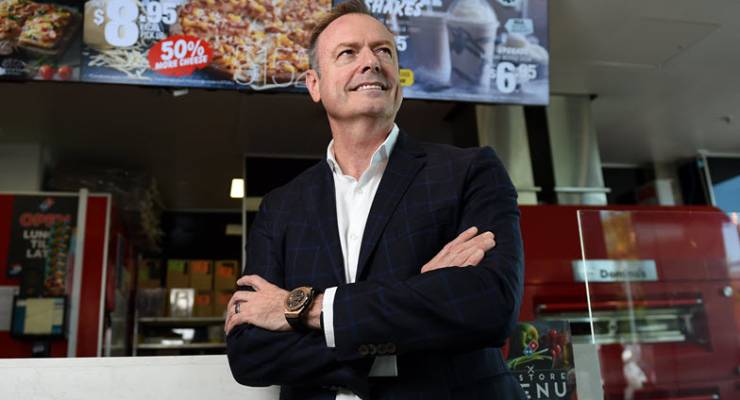
Domino’s CEO Don Meij has topped the list of Australia’s highest paid chief executives, taking home a staggering $36.8 million in the 2017 financial year. Cue lots of “is it maybe time to put a cap on these things/ought there be greater transparency?” talk, and a lot of fun with puns about “dough” and “making a crust”.
So just what do you have to do to get your hands on a slice of a pie that big (see, we can all do it)? Let’s have a little look back at how his company and those who work for it have fared during Meij’s triumphant reign over the last year or so.
February 2017
Fairfax reveals the punishing squeeze on Domino’s franchisees, which inevitably led to widespread underpayment and exploitation of vulnerable employees, particularly migrants. Managers were instructed to — whatever the circumstances, by whatever means — keep their labour costs below a certain percentage of their sales revenue, resulting in widespread “trimming” of workers’ shifts, recording shifts as far shorter than they were, and paying staff less accordingly. It was alleged some staff where paid as little as $10 an hour. Further, vulnerable migrant workers were in some cases required to pay up to $150,000 to be sponsored for the relevant work visas.
Meanwhile, Domino’s profits skyrocketed from $26.9 million in 2012 to $92 million in 2016. Meij, for his part, described the whistleblowers who had talked to Fairfax as blackmailers and criminals:
The Domino’s boss said he was “embarrassed” by a “small minority” of store owners doing the wrong thing but rejected claims the company’s business model put pressure on franchisees to do the wrong thing.
That is just the allegations of the guilty. So here we have people who have done the wrong thing and they’re not taking responsibility for their actions and decisions. They blackmail us upfront and say well we’re not paying this back or we’re going to the media. They then go to the media and they’re made out as if they’re whistleblowers or heroes. These are the criminals who did the wrong thing, so that’s just absolutely absurd.
Later he would deny there was anything systemic about the exploitation going on at Domino’s stores:
“It was a small number of franchisees who did the wrong thing here,” he told the ABC. “But [I’m] extremely disappointed they chose to take that path.”
August 2017
If you think this chronic underpayment means the legal minimums that were supposed to apply to Domino’s workers was onerously generous, think again. Of all the questionable deals struck between the Shop Distributive and Allied Employees and big employers, the Domino’s deal (struck in 2005 and continuing to operate after its expiry) is possibly the worst — falling well below the relevant award minimums, particularly for delivery drivers.
In August, the SDA for their part acknowledged this in applying to have the agreement terminated in the Fair Work Commission, as did the more radical challengers to the SDA, the Retail and Fast Food Workers Union. RAFFWU’s analysis estimated Domino’s was saving $35-$50 million a year from the agreement as opposed to the award.
November 2017
The Commission agreed, terminating the agreement and forcing Domino’s franchisees to give their employees with such luxuries as penalty rates.
Elsewhere, workplace watchdog the Fair Work Ombudsman — which, following the revelations in Fairfax, had initiated an investigation in March 2017 — slammed Domino’s for their lack of co-operation.
“For all the things we might say about 7-Eleven, after the scandal broke… I asked 7-Eleven to provide us with information about their internal audits, and they provided that information voluntarily,” Ombudsman Natalie James said.
Yep, the regulator looked at 7-Eleven, a business where exploitation of vulnerable workers wasn’t part of the system, but the system itself and still found more to like than at Domino’s.
February 2018
Domino’s share prices are revealed to have dropped 9%, making it “one of the worst performers on the Australian share market”.
March – June 2018
A parliamentary inquiry into the franchise sector is announced. Much worse was to follow what had already been revealed in the media. Domino’s ditched the agreement they’d been negotiating with the SDA dropping (in this case, raising) employees to the minimum award wage.
Meij was hauled in front of the inquiry, and said he couldn’t guarantee the exploitation had ceased since the investigation had commenced.
“We do not control the stores. We don’t run all of the payrolls,” he said. “What I can guarantee you is that if information is provided to us we will act as swiftly as we possibly can.”
Meanwhile, there were more damning allegations, such as the racial targeting of franchisees from certain backgrounds for “random” audits — something Domino’s denies.
July 2018
Citi analysts place a “sell” rating on Domino’s shares, and Credit Suisse classify them as “under-performing”– this precipitated a sell-off , and its share price dropped more than 9%.








Pizza pimple pus.
The clever country…agile, nimble. Rewarding CEO’s who come up with the best Pizza sauce.
So, his salary plus bonuses is almost half their net profit?
In 2006 Macquarie Bank CEO Allan Moss earned a salary of $33.49M which was astonishing at the time. Over a decade later it still seems extraordinary but at least Macquarie’s share price was escalating at the time.
Well that’s it. Boycott time. I’m never going to buy a Domino pizza. Not even a first one. That’ll show the greedy sod